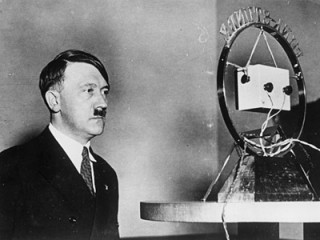
Adolf Hitler biography
Date of birth : 1889-04-20
Date of death : 1945-04-30
Birthplace : Braunau am Inn, Austria
Nationality : Austrian-German
Category : Historian personalities
Last modified : 2010-04-23
Credited as : Leader of the Nazi Party, dictator of Germany, Eva Braun
2 votes so far
A decorated veteran of World War I, Hitler joined the precursor of the Nazi Party (DAP) in 1919 and became leader of NSDAP in 1921. Following his imprisonment after a failed coup in Bavaria in 1923, he gained support by promoting German nationalism, anti-semitism, anti-capitalism, and anti-communism with charismatic oratory and propaganda. He was appointed chancellor in 1933, and quickly transformed the Weimar Republic into the Third Reich, a single-party dictatorship based on the totalitarian and autocratic ideals of national socialism.
With a passion to be an artist and an architect, young Adolf Hitler spent many years in Vienna, after dropping out of school at age 16, where he sold paintings on postcards to locals and tourists alike. Without the support of his father in his pursuits, he quickly ran out of money and lived in a homeless shelter. Some evidence suggests that Hitler was exposed more than ever to anti-Semitism during his time there, as the city had a large Jewish community, which fostered his evolving ideology.
Hitler went to Munich, Germany in 1913 and was fascinated with the architecture and art of the place. But, as he fed his aesthetic hunger, he also joined the Bavarian Army in World War I, where he served in France and Belgium under Ludwig III. He received a badge for a wound he received from enemy fire.
Becoming a German patriot, but not a full-fledged citizen meant that Hitler couldn’t hold any real public office. He remained in the Army after World War I and moved up to the position of a police spy where he was to convince other small political groups on a scheme of propaganda and ‘national thinking’ that Jews in Germany had cost them the war.
Adolf Hitler had become an excellent orator in front of crowds. After hearing him speak, people feverishly followed and believed what he said. Hitler became the leader of the newly dubbed National Socialist German Workers Party and his speeches against communism, capitalism, and groups such as the Jews, won him national backing on every level.
In his autobiography called Mein Kampf, which he dictated while serving a short prison term, he talks about both his personal struggle growing up as a ‘misunderstood artist’ and how his political beliefs were formed. Hitler made millions from its publication and by World War II, it was required reading in Germany.
With the Great Depression taking place in the United States and elsewhere in the world, Germany too fell into economic hardships. Hitler was able to bridge the lower and middle classes together in hopes of bringing Germany back to its previous greatness. His party assigned him to a post so that he could receive German citizenship and he ran for president. Hitler was sworn in as the Chancellor and his Nazi Party had already gained control of many of the top governmental offices. Eventually, Hitler lifted himself to dictator with full-fledged support from many parties. He now had control of the military, to which no one else had power.
Hitler improved the infrastructure of Germany and the living standards of different classes. He also began his campaign to take over other European lands and to exterminate anyone he saw as a hindrance to his progress – namely the Jews. As Hitler attached Poland, no other country did much to stop him. By the time Hitler had attacked the Netherlands, France declared war, but were quickly defeated. Then, Hitler declared war on the United States by siding with Japan, and marked the beginning of World War II.
Between 1939 and 1945, until Hitler’s defeat, he and Heinrich Himmler had been involved in the killing of over eleven million people, including more than six million Jews. It has been called the ‘Holocaust’. The end of the war came when Russia, Britain, and the United States took Munich.
In the final days of the war, at the fall of Berlin in 1945, Hitler married his long-time mistress Eva Braun and, to avoid capture by Soviet forces less than two days later, the two committed suicide.
















